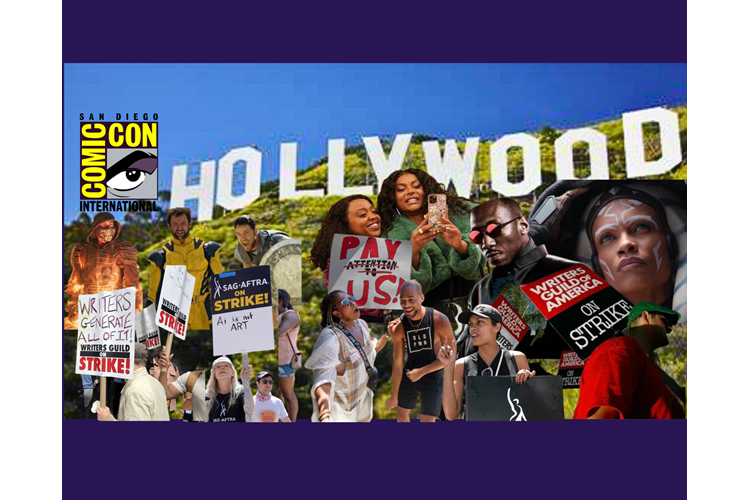
Author -Byron Canady MScEB
Introduction:
In the ever-evolving landscape of popular culture, comic books have played a significant role in shaping the entertainment industry. These colorful, character-driven narratives have captured the hearts of millions and inspired blockbuster films, television shows, and a thriving convention circuit. However, the industry is not impervious to the ripple effects caused by labor strikes, such as those initiated by the Writers Guild of America (WGA) and the Screen Actors Guild (SAG). This article delves into the impact of these strikes on the comic book and comic book convention industry, highlighting the importance of creative solidarity in navigating challenging times.
The Comic Book Industry: A Nexus of Creativity:
Comic books are the birthplace of some of the most beloved superheroes and villains, immersing readers in imaginative worlds that transcend the boundaries of reality. The creative process behind these graphic narratives involves the collaborative efforts of writers, artists, editors, and more. However, the comic book industry has deep connections with the larger entertainment landscape, especially through adaptations into movies and TV shows. Consequently, when strikes disrupt the production of such adaptations, the repercussions extend far beyond Hollywood.
The Writers Guild Strike: Paralyzing the Narrative:
The Writers Guild of America strike in recent years has had a profound impact on the comic book industry. With many comic book writers also working in the television and film industry, their absence from the writers' room leaves comic book storylines in a state of limbo. Delays in publication, incomplete story arcs, and creative uncertainty become prevalent as the strike disrupts the flow of narratives. Readers and fans, eagerly awaiting the next installment of their favorite comics, find themselves grappling with a lack of closure and an uncertain future.
The Screen Actors Guild Strike: Silent Superheroes:
While the Writers Guild strike directly affects the written content, the Screen Actors Guild strike hits the comic book industry through a different avenue. The onscreen portrayal of superheroes and their counterparts in movies and television shows relies heavily on the talent and performances of actors. A strike by the Screen Actors Guild halts the production of adaptations, preventing fans from witnessing their favorite comic book characters come to life. This interruption not only affects the comic book industry but also disrupts the convention circuit, where fan interactions with actors bring an added layer of excitement and immersion.
Impact on Marginalized Creators
Representation and Creative Control:
Strikes by the Writer's Guild and Screen Actor's Guild can potentially impact the representation and creative control of marginalized groups in comic books. Black, women, and LGBT comic book creators have been making significant strides in recent years, both in terms of representation within the industry and in the stories they tell. However, if these creators are part of the unions that are on strike, their ability to contribute to ongoing comic book projects or negotiate their own terms may be affected. This can result in delays or changes in storylines, character development, and overall representation.
Work Opportunities:
Strikes can disrupt the normal flow of production and release schedules in the comic book industry. This can have a disproportionate impact on marginalized groups, including Black, women, and LGBT creators, who may already face barriers in accessing work opportunities. If comic book projects are put on hold or delayed due to the strike, it can limit the number of available assignments or projects for these creators, potentially affecting their income and career progression.
The Importance of Creative Solidarity:
In times of strikes and labor disputes, creative solidarity becomes paramount. Comic book creators, writers, artists, and fans must come together to support one another and ensure the survival of the industry. Collaboration between writers, for instance, allows comic book narratives to evolve and continue despite the absence of striking writers. Artists, too, play a crucial role by lending their talents to unfinished storylines, breathing life into the visual aspects of comics.
The convention circuit, a staple of comic book culture, can serve as a platform for displaying this solidarity. Fans, industry professionals, and enthusiasts alike can rally behind the affected creators and show their unwavering support. By promoting alternative content, organizing panel discussions, and engaging with independent creators, conventions can ensure that the spirit of creativity endures even in the face of strikes.
Conclusion:
The comic book and comic book convention industry are intertwined with the broader entertainment landscape. Strikes by organizations such as the Writers Guild of America and the Screen Actors Guild reverberate through this intricate web, affecting creators, readers, and fans alike. However, in the face of adversity, the importance of creative solidarity becomes evident. By fostering collaboration, supporting independent creators, and maintaining enthusiasm during difficult times, the industry can weather the storm and emerge stronger than ever. As fans, we must remember that our dedication and support can make a significant difference, ensuring the continuation of the beloved stories that shape our pop culture landscape